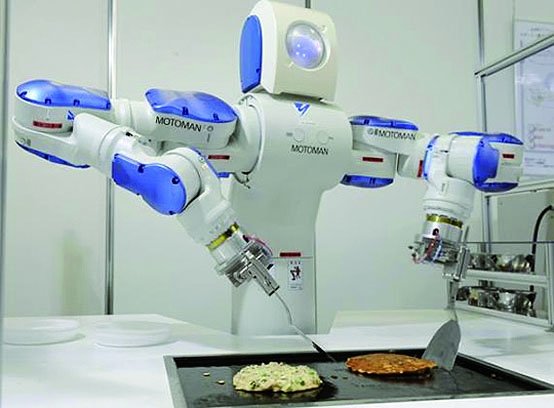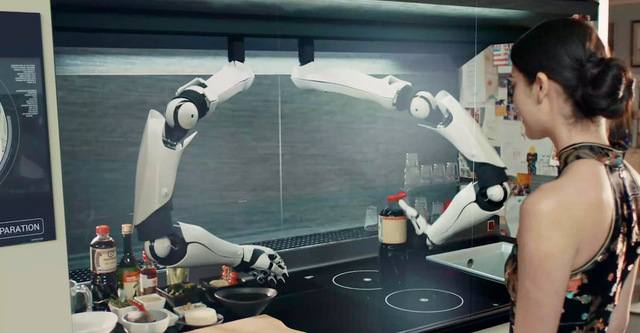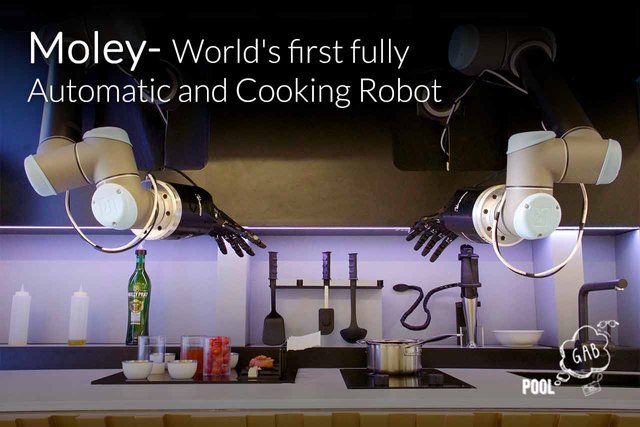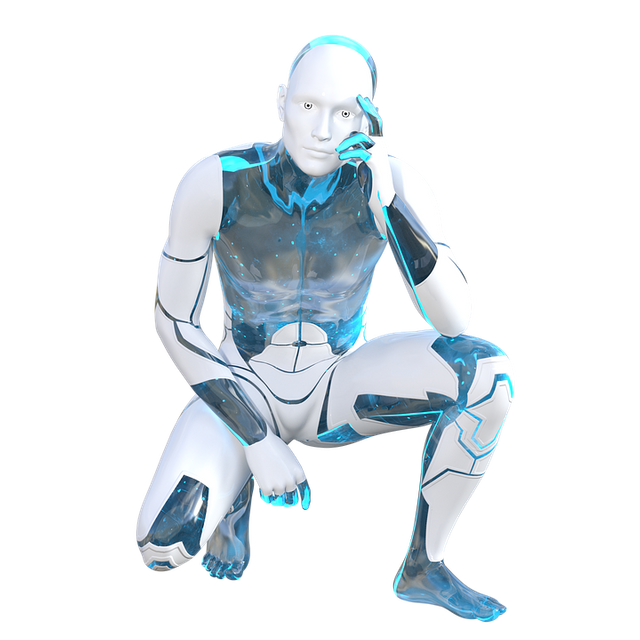ROBOTICS KITCHEN - Robotic kitchens are here. But who wants a robot to cook for him?!
The future is here already. Nobody could have predicted with any degree of certainty, 10 years ago, that a robotic kitchen would emerge to displace all the conventional methods of cooking. Our grandmothers in this part of the world used fire woods to cook meals. Then came the kerosene stove, especially in the urban centres. Now, gas is gradually replacing the stove, mostly for those that can afford it. This is against the background of the current global campaign for adoption of clean energy, to reduce the effects of earth warming.
While gas has become the preferred energy for cooking, a new technology has emerged to reduce, or even totally eliminate, the involvement of humans in all kitchen activities. It’s all in line with man’s quest to use technology to make life much easier than it has ever been, the same way the smart phone has made virtually every facet of life easy.
ENTER ROBOTIC KITCHEN!

Robots are taking over kitchen activities that are traditionally performed by humans. You don’t need to be physically present in the kitchen any longer to have your meals cooked. Now, robots can cook for you, lay your table, inform you when food is ready, pack and wash the dishes when you are done with your meal, and arrange them properly in their various compartments. The only human involvement in the process of cooking is issuance of instructions, by programming, to the robot on what to cook. The machine handles the rest. It’s as simple as that.
For some, the idea of having a machine handle cooking might look attractive, but o others, it is outlandish. The idea is appealing to work-class women who have to juggle responsibilities in the office and at home, as wives and mothers, but is also reprehensible to those amongst them to whom cooking is a hobby, whether or not they are working. It’s worse for those that work in the hospitality industry or industrial kitchens, to whom the machine may spell doom, through job loss.
HOW ROBOTIC KITCHEN WORKS
BA Medium.com blog post by the founder and Chief Executive Officer of Moley Robotics, the United Kingdom-based company that is pioneering the deployment of robo-kitchen, Mark Oleynik states:
The basic concept of the invention is that the machine records the motions of a human chef, then recreates them. So the robot will only do what the human chef did.
According to Oleynik who found the company in 2015, the machine works by specifying the number of portions, type of cuisine, dietary restrictions, calorie count, desired ingredients, cooking method, chef etc. from the recipe diary first. Then with a single tap, you could chose your recipe, place the individual pre-packaged containers of measured, washed, cut ingredients on designated spots, and press 'start' for the cooking process to begin.
Consisting of all the necessary cabinetry, appliance, utensils and two fully articulated robotic motion capture system (which records each movement of the chef master while wearing special gloves with sensors), among other features, this kitchen could cook anything, the same way a human chef does. Currently developing an automatic dishwasher facility, Oleynik foresees the robotic chef being able to clean the kitchen surfaces after cooking, as well. Moley has already launched the world's first fully-automated and integrated intelligent cooking robot - a robotic kitchen that has unlimited access to chefs and their recipes worldwide. Thus, not only can this robotic chef cook over 100 different meals, it can clean up itself after performing the task. The current prototype of the Moley Robotic kitchen includes two robotic arms with hands equipped with tactile sensors, an oven, an electric stove, a dishwasher and a touchscreen unit. These artificial hands can pick up and interact with most kitchen equipment, such as blenders, whisks, knives and the hob.
It captures, with an integrated 3D camera and wired glove, the entire work of a human chef and uploads it into a database. The chef's actions are translated into digital movements using gesture recognition algorithms created in collaboration with Stanford University and Carnegie Mellon University professors. Later, the robotic kitchen reproduces the whole sequence of actions to cook an identical meal from scratch.
In the current prototype, the user operates the installation via a built-in touchscreen or smart phone application, with cooking ingredients prepared in advance and put in preset locations.
Moley Robotic's objective in the future is to enable the user to select from a library of over 2,000 recorded recipes. While the first version of this robotic kitchen will feature a little over 100 recipes, Oleynik expects to expand the library to more than 2,000 recipes. An existing kitchen can be converted to become a robo-kitchen, while a new house can be fitted with robo-kitchen, from the very beginning. The goal of Moley Robotics is to produce a consumer version of a robotic kitchen that will allow users to order food on their mobile device and have it ready and waiting when they arrive home.
CHALLENGES
The robotic kitchen comes with its challenges. And experts are legitimately worried about those challenges. There is worry, from a human angle. For instance, if the robot lacks the key senses of a human being, the question arises as to how it could adjust its pressures to kneading dough according to its consistency. How is this human and/or psycho-philosophical concern to be tackled and resolved?
As promising as a fully automated burger maker is, it would appear to need some human help. Although the robot will be cooking, it would need some assistance to fill the gaps. Chefs put a little bit of themselves into every meal that is prepared, making no two dishes identical. Apparently, the role would also challenge the applicant to "pick-up some new skills that aren't part of typical restaurant work", such as software troubleshooting, market research and product development.
There is no doubt that robo-kitchen would be disruptive, precisely like digital payment platforms, fintech, bitcoins and virtual currencies are disrupting the conventional human relationships with the financial and banking world.
The greatest worry at the moment is the disruptive nature of the technology. But the worry is temporary, given the ability of human beings for easy adaptation to changing circumstances. The human affinity with intelligent machines such as smartphones, etc, has since been established as a fact of life.
Then there is the individual choice in deciding whether to acquire a robo - kitchen or not. The marketplace itself is also flexible enough to adapt to the emergence and intrusion of this type of technology.
COST CONSIDERATION
Moley's household cooking solution will not come cheap. When commercially released, they could cost around $15,000. Housing developers have even taken great interest I Moley's robot chefs. they have ongoing discussions with a group that manages $20 billion I housing assets and new builds. They see the potential for bringing a unique feature to their housing stock, allowing for them to create a premium set of units that could command a higher price tag. New buyers could also choose to add these kitchens as a option during the specification stage.
Robo-kitchen is part of the Fourth Industrial Revolution. The robotic kitchen could one day be able to create a variety of world-class dishes for the domestic kitchen and other preparation areas. It's a brave new world of kitchen domestics, just like electric vehicles that will soon be regular features on highways.




Very interesting post.
Unfortunately, it is true that people leave more and more work to the robots. Maybe a meal prepared by a "Chef robot" is better than any ready meal or sauce from the supermarket, but I'm against it. Robots make people stupid and lazy. Humans have to care for themselves. There are already too many people who cannot distinguish between pears and quince.
If food is always prepared by strangers or robots, emotions are lost. Many of us have no appreciation for animals. In some shops is milk cheaper than water. What we don't like we throw away. etc...
Last but not least, no robot in the world can and will cook with love :)
Well the world is advancing really fast that soon robots might even take over it.
One thing i know is because of the manner in which culture and tradition is held in high esteem in my country, it will be difficult to go along with this crazy trend..
Thanks for stopping by @bedee....
Means a lot to me..
Interesting! Resteemed
Wow...
Thanks a lot